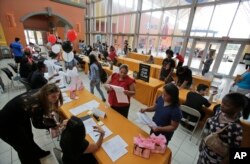The U.S. said Friday its labor market rebounded sharply from three months of weak job growth, adding 271,000 more jobs in October and likely easing the way for the central bank to raise interest rates next month.
The Labor Department reported the U.S. unemployment rate edged down to 5 percent last month - the lowest rate in seven years.
The world's largest economy shrugged off a sluggish manufacturing sector, showing strong job growth in professional and business services, health care, retail, food services and construction.
Analysts had been predicting a much weaker employment advance last month, only slighter better than the 145,000-a-month average for August and September.
Analysts say the robust October hiring is likely to ease the path for the Federal Reserve, the U.S. central bank, to boost its benchmark interest rate next month.
Interest rate
Fed policymakers have been closely watching the pace of job growth, the unemployment rate and other business indicators to determine when is the right time to adjust its key rate, at near zero percent for several years during the nation's gradual recovery from the steepest recession since the Great Depression of the 1930s.
Mark Vitner, the senior economist at Wells Fargo Bank, one of the largest in the U.S., told VOA that Friday's report was "pretty favorable," and that "It should put to rest the doubts that had cropped up in the last couple months."
He said, "It's very likely [the Fed] is going to raise rates in December," possibly by a quarter of a percentage point.
Fed chair Janet Yellen said this week that the U.S. economy is generally healthy, and saw a possible rate boost in December as a "live possibility." That could trigger higher borrowing costs for businesses and consumers, but also keep inflation from increasing too fast.
The Fed originally considered raising interest rates months ago, but put those plans on hold after job growth in the U.S. slowed - dipping from more than 200,000 new jobs a month in the first half of 2015. At the same time, U.S. manufacturing has slowed and economies overseas are struggling, with worries about a weakening Chinese economy, the world's second biggest.
Still, the U.S. economy has advanced. The unemployment rate is down by half from its worst point - 10.1 percent in October 2009 - when U.S. employers were laying off hundreds of thousands of workers every month. Those job losses caused millions of Americans to lose their homes due to bank foreclosures when they were unable to make home-loan payments.






